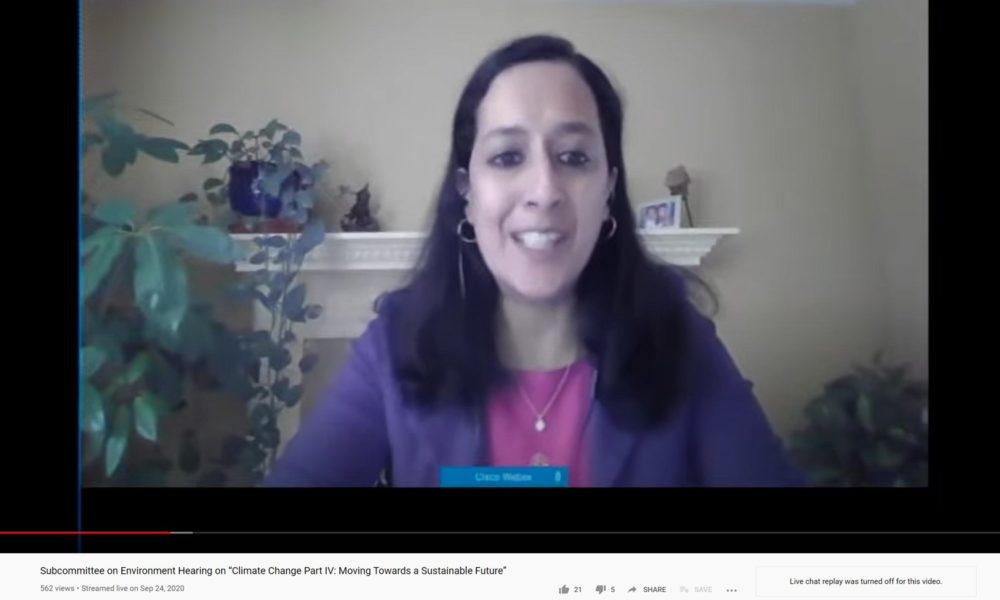Last week, I had the opportunity to testify before the House Committee on Oversight and Reform, Subcommittee on the Environment, at a hearing entitled ‘Climate Change, Part IV: Moving Towards a Sustainable Future.’ Below is my oral testimony, as prepared (shortened a bit during delivery to respect time constraints). Also, here is a link to my written testimony, as submitted to the committee.
Hello and thank you, Chairwoman Maloney, Chairman Rouda, Ranking Member Green, and Members of the Committee, for providing me the opportunity to testify remotely today. My name is Rachel Cleetus and I am the policy director for the climate and energy program at the Union of Concerned Scientists.
Our nation faces multiple, compounding crises right now—the COVID-19 pandemic, an economic crisis, the climate crisis and a long-standing crisis of systemic racism. These crises also are laying bare and exacerbating all the fundamental socioeconomic inequities in our society. We must respond with bold, multi-faceted and just solutions which can help our nation recover and rebuild from the current crises while also setting us on a path to a fairer, healthier, more prosperous and climate-safe economy for the long term.
This week, the US passed the tragic milestone of 200,000 deaths from COVID-19 and over 6.9 million cases since the pandemic first began. Millions of people are out of work and many are facing a loss in unemployment benefits, potential eviction from their homes, hunger, loss of health insurance and other hardships.
Meanwhile the climate crisis continues unabated. We are in the midst of devastating and unrelenting hurricane and wildfire seasons, worsened by climate change. Twenty-three named storms, nine landfalling, and we are still two months away from the official end of the hurricane season. Wildfires have burned over 7 million acres in the US thus far, and in California four of the state’s largest wildfires on record have started since August.
The climate extremes we are experiencing are also very costly, with the nation experiencing year-on-year of multiple billion dollar plus disasters. Increasingly, major banks, businesses, regulators and the financial sector are sounding the alarm.
The Government Accountability Office has repeatedly flagged climate change as a key area of fiscal exposure for the federal government, and called for better management and proactive reduction of these risks.
UCS research shows that under a high sea level rise scenario, by 2045, about 325,000 coastal properties worth $136 billion will be at risk of chronic flooding. That rises to approximately 2.5 million US coastal homes and commercial properties currently worth more than $1 trillion by the end of the century.
Without global action to reduce heat-trapping emissions, our research also shows that the number of days per year when the heat index exceeds 100 degrees Fahrenheit would more than double from historical levels to an average of 36 across the country by midcentury and increase four-fold to an average of 54 by late century.
We’ve also analyzed the threats of sea level rise and extreme heat on military installations in the US, which could pose risks to service members, critical infrastructure and essential operations.
Our research on the exposure of 18 military installations along the East and Gulf coasts found that in the absence of preventive measures:
- By 2050, most of these installations will see more than 10 times the number of floods they experience today.
- By 2100, eight bases are at risk of losing 25 percent to 50 percent or more of their land to rising seas and four are at risk of losing between 75 and 95 percent of their land.
And our analysis of the impact of extreme heat on major military bases in the US shows that:
- By midcentury military installations in the US would experience nearly five times as many days with a heat index above 100°F as they have historically
We can limit the costs and harms of climate change by investing in a just and equitable transition to a low-carbon climate-resilient economy. States, cities, businesses and ordinary people are leading the way in implementing solutions BUT we cannot achieve our goals without robust federal action.
- The US must contribute its fair share to global goals by achieving net zero carbon emissions no later than 2050 and cutting its emissions by at least half by 2030. We need federal policies to boost investments in renewable energy, energy efficiency, energy storage, a modernized electricity grid; electrification of transportation, heating and cooling, and industrial processes; R&D in low-carbon technologies; and climate-smart agricultural and forestry practices. This is a POSITIVE future that we should embrace—because a low-carbon economy will help cut emissions, create jobs, boost public health and address long-standing inequities.
- We must also invest proactively in resilience measure to protect and prepare communities for worsening climate impacts, including investing in climate science, public health protective measures, and increasing the resilience of critical infrastructure.
- The climate agenda must address the cumulative burden of toxic and harmful pollution in overburdened communities and ensure that these communities benefit directly and equitably from investments in clean energy and climate resilience, as detailed in the Just and Equitable National Climate Platform.
- A fair clean energy transition must also center the needs of working people, including by protect retiree pensions and health benefits, providing retraining and job opportunities, and investing in diversifying local economies, and as powerfully detailed in the BlueGreenAlliance Solidarity for Climate Action platform and the National Economic Transition Platform.
- Our ability to solve complex interdependent challenges like the COVID-19 pandemic and climate change depends on working in cooperation with other countries and multilateral institutions, such as the World Health Organization (WHO) and the United Nations Framework Convention on Climate Change (UNFCCC).
We urge Congress to engage directly and meaningfully with a diverse range of stakeholders as it crafts legislation to address climate change. The recent Majority staff report from the House Select Committee on the Climate Crisis has put forth an important foundation for this work that Congress must now act upon. We welcome the climate change agenda put forward today by Chairwoman Maloney and Chair Rouda.
Most immediately, Congress should pass a well-funded emergency COVID-19 relief package that focuses on those who are most in need and disproportionately affected, including assistance for unemployment, food, housing, and energy bills. Clean energy tax incentives are another important near-term imperative.
As we turn to economic recovery, we need to jump-start the economy by boosting low-carbon climate-resilient investments that are huge job-creating opportunities, and ensure these investments are equitable by targeting 40 percent to marginalized communities.
Like many families, this week my family has been navigating the challenges of a new school year in the era of COVID-19. We’re all trying to make the best decisions we can for our children based on the facts we have, with considerable help from our communities. For all too many the burden is even higher in the face of socioeconomic disparities.
Our children deserve to know that we will come together to do our utmost to safeguard their future in the face of the climate crisis, just as we are trying to do right now. Let us not give in to short-sightedness or selfishness. Let us be guided by the science and do what’s right. The stakes couldn’t be higher or clearer.
Thank you for the opportunity to testify today.

